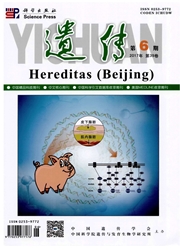

 中文摘要:
中文摘要:
抑癌基因突变是癌症发生过程中一个极为关键的事件。p53作为体内最重要的抑癌基因之一,在人类癌症中发生突变的频率高达50%。同时,p53突变也是人类遗传病Li-Fraumeni综合征的主要病因。p53最常见的突变形式是错义突变,所形成的突变体p53不但失去了野生型p53的抑癌功能,而且还获得了一系列类似于癌基因的功能,促进了肿瘤的进程。文章拟对突变体p53的结构功能改变,获得癌基因活性的分子机制,以及近年来对封闭突变体p53活性所进行的探索等研究方向所取得的进展做一综述。
 英文摘要:
英文摘要:
Inactivation of tumor suppressor gene is a key event in carcinogenesis, p53 is one of the most important rumor suppressor genes in the genome, and its mutations are found in approximately 50% of human cancers, p53 mutation is also the main cause for human Li-Fraumeni syndrome. The vast majority of p53 mutations are missense mutations, and the corresponding mutant p53 proteins not only lose wild-type p53 tumor suppressor activities, but also gain new oncogenic properties favoring cancer development. Here, we mainly discussed the structural and functional alterations of mutant p53, the molecular mechanisms underlying gain of oncogenic functions, and the strategies and explorations of suppressing mutant p53 activities.
 同期刊论文项目
同期刊论文项目
 同项目期刊论文
同项目期刊论文
 Two-dimensional blue native/SDS PAGE analysis reveals HSPs chaperone machinery involved in HBV produ
Two-dimensional blue native/SDS PAGE analysis reveals HSPs chaperone machinery involved in HBV produ Proteome-wide prediction of signal flow direction in protein interaction networks based on interacti
Proteome-wide prediction of signal flow direction in protein interaction networks based on interacti JAB1 interacts with pro-apoptotic BH3-only BclGs and involved in the regulation of mitochondrial apo
JAB1 interacts with pro-apoptotic BH3-only BclGs and involved in the regulation of mitochondrial apo Deactivation of IKK by CUE domain containing 2 (CUEDC2) via recruitment of the protein phosphatase P
Deactivation of IKK by CUE domain containing 2 (CUEDC2) via recruitment of the protein phosphatase P First insight into human liver proteome from PROTEOMESKY-LIVERHu 1.0, a publicly-available database.
First insight into human liver proteome from PROTEOMESKY-LIVERHu 1.0, a publicly-available database. Proteomic screen defines the Hepatocyte Nuclear Factor 1binding partners and identifies HMGB1 as a n
Proteomic screen defines the Hepatocyte Nuclear Factor 1binding partners and identifies HMGB1 as a n Functional polymorphisms in the promoters of MMP-1, MMP-2, MMP-3, MMP-9, MMP-12 and MMP-13 are not a
Functional polymorphisms in the promoters of MMP-1, MMP-2, MMP-3, MMP-9, MMP-12 and MMP-13 are not a Systematic characterization of the covalent interactions between (—)-epigallocatechin gallate and pe
Systematic characterization of the covalent interactions between (—)-epigallocatechin gallate and pe A New Strategy to Filter out False Positive Identifications of Peptides in SEQUEST Database Search R
A New Strategy to Filter out False Positive Identifications of Peptides in SEQUEST Database Search R NuSAP is degraded by APC/C-Cdh1 and its overexpression results in mitotic arrest dependent of its mi
NuSAP is degraded by APC/C-Cdh1 and its overexpression results in mitotic arrest dependent of its mi Phosphoproteome Profile of Human Liver Chang’s cell Based on 2-DE with Fluorescence Staining and MAL
Phosphoproteome Profile of Human Liver Chang’s cell Based on 2-DE with Fluorescence Staining and MAL Lack of support for an association between CLEC4M homozygosity and protection against SARS coronavir
Lack of support for an association between CLEC4M homozygosity and protection against SARS coronavir Proteome analysis of hepatocellular carcinoma by two-dimensional difference gel electrophoresis: nov
Proteome analysis of hepatocellular carcinoma by two-dimensional difference gel electrophoresis: nov Functional Polymorphisms and Haplotype in the Promoter of MMP-2 Gene Are Associated with Risk of Nas
Functional Polymorphisms and Haplotype in the Promoter of MMP-2 Gene Are Associated with Risk of Nas MDM2 Promoter SNP309 is Associated with Risk of Occurrence and Advanced Lymph Node Metastasis of Nas
MDM2 Promoter SNP309 is Associated with Risk of Occurrence and Advanced Lymph Node Metastasis of Nas Lack of Association between the Functional Polymorphisms in the Estrogen-metabolizing Genes and Risk
Lack of Association between the Functional Polymorphisms in the Estrogen-metabolizing Genes and Risk No association of MMP-7, MMP-8, and MMP-21 polymorphisms with the risk of hepatocellular carcinoma i
No association of MMP-7, MMP-8, and MMP-21 polymorphisms with the risk of hepatocellular carcinoma i 期刊信息
期刊信息
